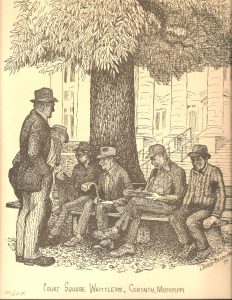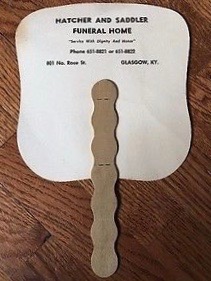Note to readers: This exploration of my family history is primarily for my kids and kinfolk. I’m posting it in my blog because I’m too cheap to set up a separate website. If you are not among my relatives you probably won’t be interested in this stuff and that’s okay.
When you’re growing up in a big city, it’s a treat to spend the summer in a small town with indulgent grandparents. My brother and I spent most of every summer in my father’s hometown of Corinth, Mississippi.
The adventure started with a train ride. My grandmother would take the train to Chicago (free because my grandfather was a railroad retiree) to collect me or my brother for the overnight trip. We’d board the train in Chicago’s bustling Illinois Central terminal, arrive at the sleepy Corinth station and ride in my grandfather’s Ford through tree-lined streets to their house.
A house! Compared to our three-room apartment, my grandparents’ modest house was a palace. A bedroom all to myself! A front porch and, best of all, a yard! That was a big deal for a city kid, because if we ventured onto the tiny front lawn of our apartment building the janitor yelled at us. In Corinth I luxuriated in the single-family territoriality of a big lawn and garden. My grandfather even built a playhouse for us.
Everything about Corinth was different. The population was about 10,000 in those days, and I could walk downtown along quiet streets with practically no traffic.  Downtown consisted of a few blocks of shops, including a Kroger supermarket and a dry-goods store with an old-fashioned trolley that carried money to a cashier upstairs and came back with change. The courthouse square had a Confederate monument (wonder if it’s still there?) and a series of park benches where elderly men in overalls spent the day whittling.
Downtown consisted of a few blocks of shops, including a Kroger supermarket and a dry-goods store with an old-fashioned trolley that carried money to a cashier upstairs and came back with change. The courthouse square had a Confederate monument (wonder if it’s still there?) and a series of park benches where elderly men in overalls spent the day whittling.
What was more interesting was a drainage ditch down the street where we could catch tadpoles. The neighbor kids and I went barefoot, which was unheard of in Chicago. My grandfather took me fishing at a nearby lake, taught me to shoot a .22 rifle and permitted me to putter around in a workshop shed that smelled like cedar shavings.
The Jim Crow South of the 1950s was strange to a Northern kid. I had never seen separate drinking fountains before, and was disappointed to find that the water in the “colored” fountain was clear instead of, say, blue or green. Despite the segregation of that era I saw more daily contact between white and black folks in Corinth than I did in Chicago, and never saw my grandparents treat any African-American individual with disrespect.
My grandmother’s cooking was plain but delicious. I helped shell peas: blackeyed, not the green peas we ate in Chicago. My grandmother made memorable cornbread and purchased fresh produce from a mule-drawn farm wagon that came down the street. She spoiled me with Dr. Pepper soda pop, a regional delicacy that was not sold nationwide until 1963. I still drink the stuff. There was no restaurant in Corinth, but a neighbor ran a hamburger stand on the highway.
Everybody knew my grandparents: They taught Sunday school at the Baptist church and my grandfather was a big wheel in the Masons. The local radio station even mentioned that the McClures’ grandson was visiting all the way from Chicago.
The pace of life was slow and the hot, humid summers made sitting still the best way to stay cool. Air conditioning was rare in those days, and the grownups sat on their front porches every evening and fanned themselves.  My grandparents’ church supplied cardboard fans (sponsored by a local funeral home) in the hymnal racks at each pew. So the minister could tell at a glance whether the congregation was staying awake through the sermon.
My grandparents’ church supplied cardboard fans (sponsored by a local funeral home) in the hymnal racks at each pew. So the minister could tell at a glance whether the congregation was staying awake through the sermon.
Years later, when I was in college, I made a brief visit and saw Brad, one of my childhood playmates, sitting on his porch across the street. We chatted a while and I asked what guys our age did for fun in Corinth.
“We go fishing, play a little softball, but mostly just set around,” he said.
Just then a teenage girl, visibly pregnant, walked by and waved. I asked: “Isn’t that little Maynette who lives around the corner?”
“Yes, she got married about a year ago,” Brad said.
“Are all the girls around here married?”
“Yep, that’s why we just set around,”
